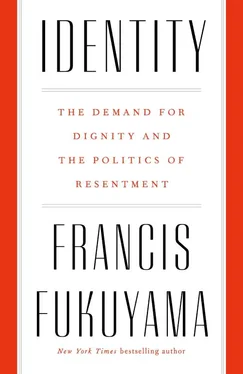But as important as material self-interest is, human beings are motivated by other things as well, motives that better explain the disparate events of the present. This might be called the politics of resentment. In a wide variety of cases, a political leader has mobilized followers around the perception that the group’s dignity had been affronted, disparaged, or otherwise disregarded. This resentment engenders demands for public recognition of the dignity of the group in question. A humiliated group seeking restitution of its dignity carries far more emotional weight than people simply pursuing their economic advantage.
Thus, Russian president Vladimir Putin has talked about the tragedy of the collapse of the former Soviet Union, and how Europe and the United States had taken advantage of Russia’s weakness during the 1990s to drive NATO up to its borders. He despises the attitude of moral superiority of Western politicians and wants to see Russia treated not, as President Obama once said, as a weak regional player, but as a great power. Viktor Orbán, the Hungarian prime minister, stated in 2017 that his return to power in 2010 marked the point when “we Hungarians also decided that we wanted to regain our country, we wanted to regain our self-esteem, and we wanted to regain our future.” {6} 6 Viktor Orbán, “Will Europe Belong to Europeans?,” speech given in Baile Tusnad, Romania, July 22, 2017, Visegrád Post , July 24, 2017, https://visegradpost.com/en/2017/07/24/full-speech-of-v-orban-will-europe-belong-to-europeans/ .
The Chinese government of Xi Jinping has talked at length about China’s “one hundred years of humiliation,” and how the United States, Japan, and other countries were trying to prevent its return to the great power status it had enjoyed through the past millennia of history. When the founder of al-Qaeda, Osama bin Laden, was fourteen, his mother found him fixated on Palestine, “tears streaming down his face as he watched TV from their home in Saudi Arabia.” {7} 7 Rukmini Callimachi, “Terrorist Groups Vow Bloodshed over Jerusalem. ISIS? Less So,” New York Times , December 8, 2017.
His anger at the humiliation of Muslims was later echoed by his young coreligionists volunteering to fight in Syria on behalf of a faith they believed had been attacked and oppressed around the world. They hoped to re-create the glories of an earlier Islamic civilization in the Islamic State.
Resentment at indignities was a powerful force in democratic countries as well. The Black Lives Matter movement sprang from a series of well-publicized police killings of African-Americans in Ferguson (Missouri), Baltimore, New York, and other cities and sought to force the outside world to pay attention to the experience of the victims of seemingly casual police violence. On college campuses and in offices around the country, sexual assault and sexual harassment were seen as evidence of men not taking women seriously as equals. Sudden attention was paid to transgender people, who had previously not been recognized as a distinct target of discrimination. And many of those who voted for Donald Trump remembered a better time in the past when their place in their own societies was more secure and hoped through their actions to “make America great again.” While distant in time and place, the feelings among Putin’s supporters over the arrogance and contempt of Western elites were similar to those experienced by rural voters in the United States who felt that the urban bicoastal elites and their media allies were similarly ignoring them and their problems.
The practitioners of the politics of resentment recognize one another. The sympathy that Vladimir Putin and Donald Trump have for each other is not just personal, but rooted in their common nationalism. Viktor Orbán explained, “Certain theories describe the changes now taking place in the Western world and the emergence on the stage of a U.S. president as a struggle in the world political arena between the transnational elite—referred to as ‘global’—and patriotic national elites,” of which he was an early exemplar. {8} 8 Orbán, “Will Europe Belong?”
In all cases a group, whether a great power such as Russia or China or voters in the United States or Britain, believes that it has an identity that is not being given adequate recognition—either by the outside world, in the case of a nation, or by other members of the same society. Those identities can be and are incredibly varied, based on nation, religion, ethnicity, sexual orientation, or gender. They are all manifestations of a common phenomenon, that of identity politics.
The terms identity and identity politics are of fairly recent provenance, the former having been popularized by the psychologist Erik Erikson during the 1950s, and the latter coming into view only in the cultural politics of the 1980s and ’90s. Identity has a wide number of meanings today, in some cases referring simply to social categories or roles, in others to basic information about oneself (as in “my identity was stolen”). Used in this fashion, identities have always existed. {9} 9 James D. Fearon, “What Is Identity (As We Now Use the Word)?,” unpublished paper, November 3, 1999, http://fearonresearch.stanford.edu/53-2 .
In this book, I will be using identity in a specific sense that helps us understand why it is so important to contemporary politics. Identity grows, in the first place, out of a distinction between one’s true inner self and an outer world of social rules and norms that does not adequately recognize that inner self’s worth or dignity. Individuals throughout human history have found themselves at odds with their societies. But only in modern times has the view taken hold that the authentic inner self is intrinsically valuable, and the outer society systematically wrong and unfair in its valuation of the former. It is not the inner self that has to be made to conform to society’s rules, but society itself that needs to change.
The inner self is the basis of human dignity, but the nature of that dignity is variable and has changed over time. In many early cultures, dignity is attributed only to a few people, often warriors who are willing to risk their lives in battle. In other societies, dignity is an attribute of all human beings, based on their intrinsic worth as people with agency. And in other cases, dignity is due to one’s membership in a larger group of shared memory and experience.
Finally, the inner sense of dignity seeks recognition. It is not enough that I have a sense of my own worth if other people do not publicly acknowledge it or, worse yet, if they denigrate me or don’t acknowledge my existence. Self-esteem arises out of esteem by others. Because human beings naturally crave recognition, the modern sense of identity evolves quickly into identity politics, in which individuals demand public recognition of their worth. Identity politics thus encompasses a large part of the political struggles of the contemporary world, from democratic revolutions to new social movements, from nationalism and Islamism to the politics on contemporary American university campuses. Indeed, the philosopher Hegel argued that the struggle for recognition was the ultimate driver of human history, a force that was key to understanding the emergence of the modern world.
While the economic inequalities arising from the last fifty or so years of globalization are a major factor explaining contemporary politics, economic grievances become much more acute when they are attached to feelings of indignity and disrespect. Indeed, much of what we understand to be economic motivation actually reflects not a straightforward desire for wealth and resources, but the fact that money is perceived to be a marker of status and buys respect. Modern economic theory is built around the assumption that human beings are rational individuals who all want to maximize their “utility”—that is, their material well-being—and that politics is simply an extension of that maximizing behavior. However, if we are ever to properly interpret the behavior of real human beings in the contemporary world, we have to expand our understanding of human motivation beyond this simple economic model that so dominates much of our discourse. No one contests that human beings are capable of rational behavior, or that they are self-interested individuals who seek greater wealth and resources. But human psychology is much more complex than the rather simpleminded economic model suggests. Before we can understand contemporary identity politics, we need to step back and develop a deeper and richer understanding of human motivation and behavior. We need, in other words, a better theory of the human soul.
Читать дальше












